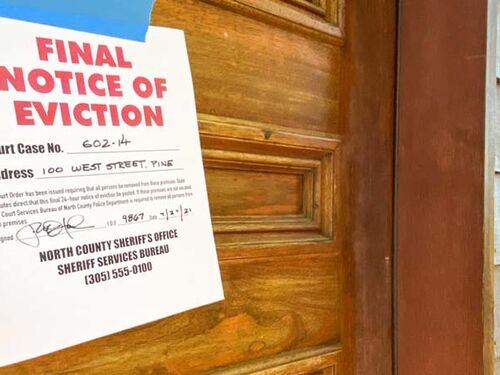Panel Says Creating White House Task Force, Expanding Housing Programs, and Improving Access to Social Supports Could Avert Rental Eviction Crisis Triggered by Pandemic
News Release
By Megan Lowry
Last update June 25, 2021
WASHINGTON — The Executive Office of the President should consider establishing a task force to prevent renter evictions and mitigate housing instability caused by the pandemic, says a new report from the National Academies of Sciences, Engineering, and Medicine. Building on existing social programs that support those struggling with poverty and housing instability, the report proposes dozens of actions to be taken within the next three years — including efficiently channeling emergency relief to renters and landlords, increasing the availability of housing choice vouchers, reforming unemployment insurance, and reducing discrimination — to address the immediate crisis and to permanently improve housing choice, affordability, and security for renters across the U.S.
Rental Eviction and the COVID-19 Pandemic: Averting a Looming Crisis says the COVID-19 pandemic has exacerbated an already severe housing crisis in the U.S., especially for low-income renters, with job losses and other economic struggles leading to the accumulation of billions of dollars in past-due rent payments. Housing instability was a problem even before the pandemic began, however; at that time, almost half of all renter households were spending more than 30 percent of their income on rent, and only one in four eligible renters were receiving federal financial assistance. Tens of millions in the U.S. are worried about their ability to pay rent now that moratoriums on payment are expiring.

“We believe programs already in place to support families can be rapidly expanded and altered to reach millions more people and prevent many more traumatic, devastating evictions,” said Karen Dynan, chair of the panel that wrote the report and professor in the department of economics at Harvard University. “In this tenuous moment of recovery for our country, new partnerships and coordination across the housing system will be key to achieving more stable housing for many — and helping our economy bounce back.”
The report is the first from the National Academies’ strategic science initiative created to provide rapid, scenario-based analyses aimed at protecting critical societal functions, avoiding worst outcomes, and leveraging opportunities during and after the pandemic. The initiative convened a strategy group of experts in health, economics, national security, and other fields to author the report released today.
“Even as we begin to emerge from the COVID-19 pandemic, it’s clear that societal impacts, such as housing instability, will continue to threaten a full recovery,” said National Academy of Sciences President Marcia McNutt. “The National Academies’ Response and Resilient Recovery Strategic Science Initiative was created to help decision-makers anticipate potential risks in an uncertain future and identify those no-regrets actions to avert negative consequences and ultimately foster a stronger, smoother recovery.”
To address evictions and housing instability, the report recommends:
Harnessing existing social programs to connect renters with financial and legal assistance. A task force established by the Executive Office of the President could devise a strategy to reach out to renters at risk of eviction with information about eviction moratoriums and legal service providers. The government can harness and scale up existing programs, and work with states to quickly distribute emergency rental-assistance funds already allocated by federal relief packages. A comprehensive reform of the unemployment insurance system could increase accessibility and benefits to help low-income renters, and the U.S. Department of Housing and Urban Development (HUD) could create an online screening tool to allow individuals to better connect with a range of social benefits, such the Supplemental Nutrition Assistance Program (SNAP) and Medicaid. Congress could also make expiration of federal extensions of unemployment insurance and SNAP contingent on improvements in state economic conditions.
Preserving, providing, and expanding safe and affordable housing. Congress could improve and expand the Low-Income Housing Tax Credit and the National Housing Trust Fund, and increase the number of housing choice vouchers so that all households with incomes below 50 percent of the median income in their area are offered this benefit. State and local authorities could incentivize investment in Section 8 properties. Federal, state, and local governments could also work to reduce exclusionary zoning practices, tying federal funding for infrastructure to states’ progress in meeting affordable housing needs.
Improving data collection to understand the scale of the problem, and who is at risk. Federal agencies and state and local governments could improve data collection and reporting on evictions and housing, and HUD could create a publicly accessible housing security dashboard to allow for a more accurate and up-to-date picture of housing insecurity in the U.S.
The study — undertaken by the Response and Resilient Recovery Strategic Science Initiative Strategy Group on COVID and Rental Evictions — was sponsored by the National Academy of Sciences.
The National Academies of Sciences, Engineering, and Medicine are private, nonprofit institutions that provide independent, objective analysis and advice to the nation to solve complex problems and inform public policy decisions related to science, technology, and medicine. They operate under an 1863 congressional charter to the National Academy of Sciences, signed by President Lincoln.
Contact:
Megan Lowry, Media Officer
Office of News and Public Information
202-334-2138; e-mail news@nas.edu
Featured Publication
Rental Eviction and the COVID-19 Pandemic: Averting a Looming Crisis
Consensus Study Report
·2022
As the federal moratorium on rental eviction is set to expire on July 31st, 2021, actionable guidance is urgently needed on how to ensure that renters can stay in their homes and housing aid reaches the communities that need it most. This report from the National Academies of Sciences, Engineering,...
View details
More like this
Discover
Events
Right Now & Next Up
Stay in the loop with can’t-miss sessions, live events, and activities happening over the next two days.
NAS Building Guided Tours Available!
Participate in a one-hour guided tour of the historic National Academy of Sciences building, highlighting its distinctive architecture, renowned artwork, and the intersection of art, science, and culture.




